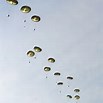
They Flew Through The Air
One of the things the new Common Core emphasizes is the ability to distinguish between serious and not-so-serious sources of information. Who can disagree that this is an important skill these days with the multiplicity of information both in print and online? Certainly not me. So I gamely gathered together a group of my top fifth graders and read some headlines from The New York Times and The Daily News to them. Both newspapers were from June 7th and the top stories were about the D-Day commemorations in Normandy. The New York Times ran a picture of the world leaders who came to the ceremonies. They wrote a serious and thoughtful account of the commemorations. They wrote of the day seventy years ago that the leaders were there to remember. They wrote about the political repositioning of the individual European countries since the end of the Second World War.
The Daily News ran a large photo of a 93-year-old man jumping out of a plane. Jim “Pee Wee” Martin from Ohio had jumped in 1944 as a member of the 101st Airborne Division and returned to France this June to jump once again. “Now There’s a Hero” read the lead and there he was indeed, a wizened old man in a ready crouch with an American flag billowing out behind him.
Which article, I asked my group, has the kind of information you would use to make a presentation to your class?
They didn’t hesitate. They didn’t need to. They all went for Pee Wee.
They hadn’t read more than the headline, and I had read both articles. Now was the time to explain the difference between serious and tabloid journalism. Yet I hesitated. For though The Times article was impeccably researched, beautifully written and did a superior job of explaining the larger political and historical issues surrounding the D-Day invasion, the fact was the article hadn’t resonated with me either. It hadn’t clutched at my heart strings. It hadn’t given me any sense of the men who had been there on June 6, 1944.
It hadn’t made me think of my father.
Now, my father never jumped out of a plane, nor did he participate in the D-Day invasion. He was in the Pacific in 1944 fighting to liberate the Philippines under General Macarthur. Yet the little, wizened man who flew through the air reminded me of him nevertheless if for no other reason than that was how my father too started to look in his late eighties, shrunken and gnome-like, but also fierce and determined.
Upon reflection, I think the picture particularly moved me because it underscored a lot of things my father wasn’t able to do. He wasn’t able to reach 93, for example. He perished at the age of 88, a whisper of his former self, diminished and worn from the battle against my mother’s Alzheimer’s, a battle which he of course lost.
Even if he had lived to 93, there was no way my father could have jumped from any kind of plane. His knees were shot many years before that, from basketball and football and a bad car accident when he was in his thirties. In his early eighties, he had to give up dancing. This bothered him immensely. He and my mother had been such dedicated swing dancers, twirling and jiving to the big bands from the forties, the bands that had been playing when they courted during the war.
All this swirled around in my head as I wondered what to say to my students. Finally, I muttered something about The New York Times being one of the best papers in the world, and suggested trying to find a video of Pee Wee to watch. They were all for it. We huddled around my computer and watched Mr. Martin descend out of the sky over Normandy amongst the pulsating mushrooms of the other parachutists. We watched him land in the French field and be hauled to his feet and shrug as if it were no big deal. We watched him tell how he had been terrified on that day in 1944, but he had still done what he was supposed to do. They all had.
I decided to set aside the discussion of sources for another day. Instead, I sat my students down and tried to explain to them what had happened on those beaches in June of 1944. I tried to explain about the men who flew through the air, and those who struggled through the waves and up the beaches, and the ones who died in the sea. I told them about my father’s generation, the men who were scared but did what they were supposed to, the men who are leaving us now, one by one, as their bodies if not their spirits finally fail them.
I tried to give them a larger sense of the history behind the day and hoped that they would remember some of it later, when they’re a little older maybe, when they can worry about sources.





Really spectacular piece, Linda! I sure wish YOU had been my teacher back in the day.
Thanks!